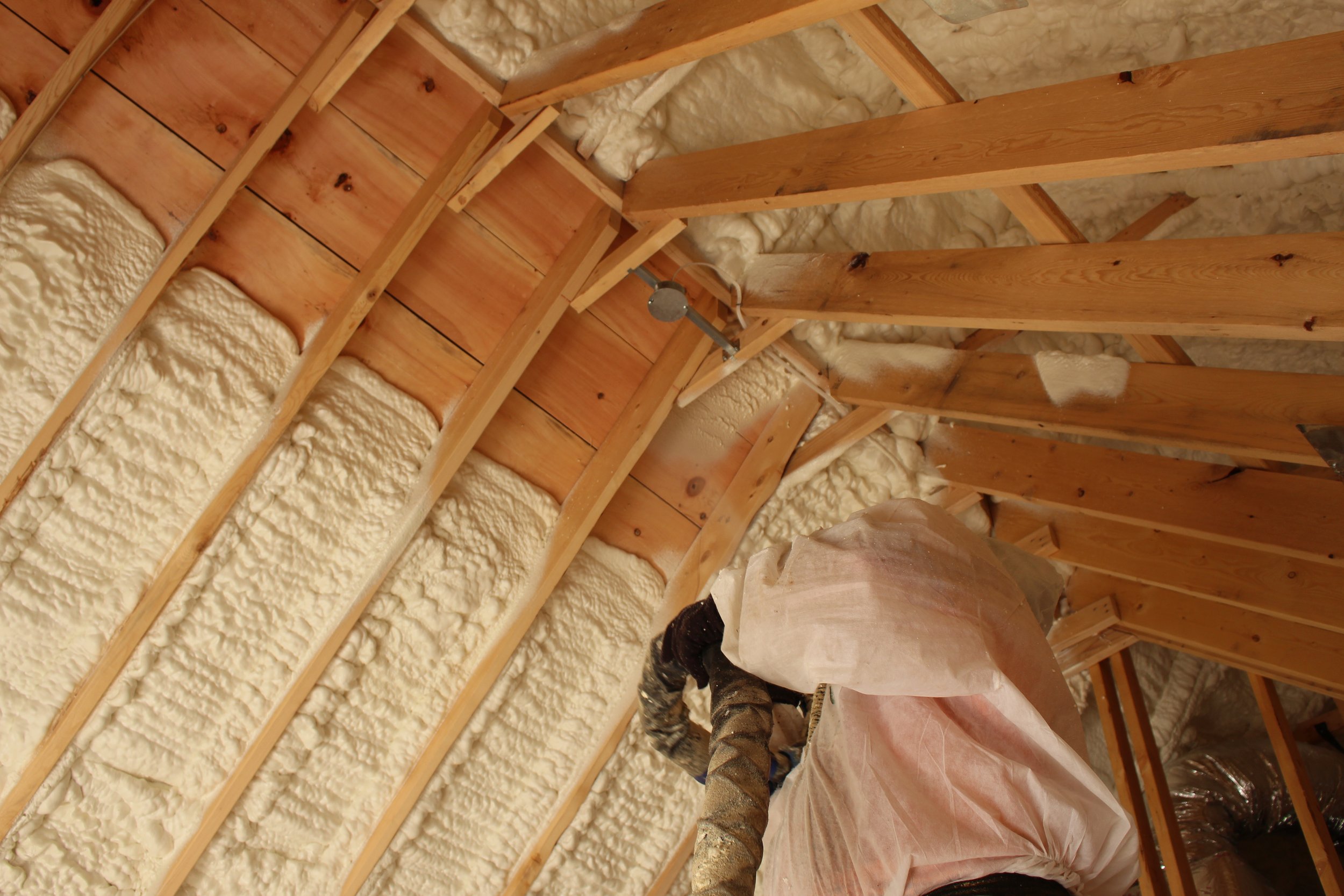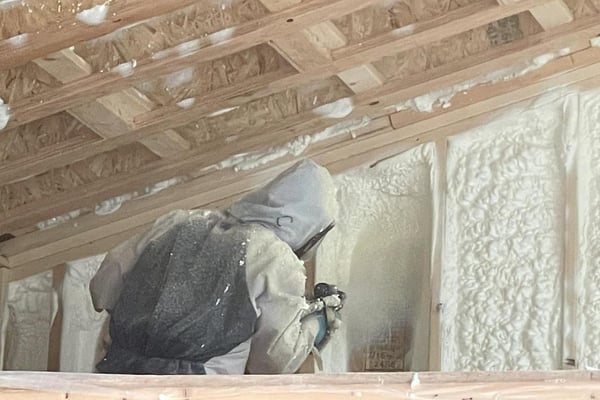Contrasting Spray Foam to Conventional Insulation: Which Is Much better?
Contrasting Spray Foam to Conventional Insulation: Which Is Much better?
Blog Article
Top Factors to Pick Spray Foam for Your Following Insulation Project
When considering insulation choices for your next job, spray foam stands apart because of its impressive performance attributes and performance benefits. Its premium R-value not only improves thermal resistance yet likewise adds to considerable energy financial savings gradually. Additionally, the material's capability to produce an impermeable seal effectively minimizes air infiltration and reduces the risk of moisture-related concerns, such as mold development. As you consider your selections, discovering the versatile applications and lasting advantages of spray foam may expose compelling reasons to include it into your insulation method.
Superior Insulation Efficiency

The high R-value of spray foam, which gauges its thermal resistance, is one more vital advantage. Closed-cell spray foam, for circumstances, can attain an R-value of approximately 6.5 per inch, dramatically outmatching fiberglass batts and cellulose. Spray foam insulation creates an airtight seal, which lessens thermal connecting and minimizes the possibility for mold development due to moisture accumulation.

Power Performance Benefits
The power effectiveness advantages of spray foam insulation are significant, additional improving its allure as a top choice for building insulation. One of the key benefits is its remarkable thermal performance. Spray foam increases upon application, producing an impermeable seal that lessens air leaks, which is a typical resource of energy loss in standard insulation materials. By effectively minimizing thermal bridging, it maintains a consistent interior temperature level, thus lowering heating and air conditioning expenses.
In addition, spray foam insulation boasts a high R-value per inch, which means it uses more thermal resistance in much less space contrasted to alternatives like fiberglass or cellulose (Spray Foam). This efficiency not only adds to instant energy cost savings yet also promotes long-term sustainability by reducing the general power intake of a building
In addition, the application of spray foam can certify property owners for energy effectiveness incentives and tax credits, including economic benefits to its energy-saving capacities. In an era where power conservation is extremely important, selecting spray foam insulation not only boosts comfort but additionally lines up with eco accountable methods, making it a prudent selection for both industrial and domestic projects.
Moisture and Mold And Mildew Resistance
Given its unique make-up and application approach, spray foam insulation offers extraordinary wetness and mold resistance, making it an excellent selection for different atmospheres. The closed-cell framework of spray foam produces a strong barrier that efficiently seals potential wetness their website access, consequently lowering the likelihood of mold and mildew development. Unlike typical insulation materials, which can take in water and supply a breeding place for mold and mildew, spray foam remains unsusceptible wetness, enhancing the total health of the indoor atmosphere.
Additionally, the application procedure of spray foam includes expanding and filling up spaces and splits, ensuring a limited seal that reduces air leaks. This characteristic not just improves power performance however additionally aids control moisture degrees within the area. Appropriate humidity control is vital for stopping mold and mildew, making spray foam insulation particularly advantageous in locations vulnerable to wetness, such as cellars and crawl areas.
Along with its moisture-resistant buildings, spray foam is additionally inherently resistant to mold growth. This characteristic makes sure that buildings and homes stay secure and healthy and balanced in time, giving tranquility of mind to property owners and structure supervisors alike.
Long-Term Expense Financial Savings
Buying spray foam insulation returns considerable long-lasting price financial savings, mainly with enhanced power performance. Unlike typical insulation materials, spray foam creates an impermeable seal that reduces air leak. This decrease in drafts leads to decrease heating & cooling expenses, as HVAC systems do not need to function as tough to keep comfortable interior temperature levels.
Furthermore, the superior shielding residential or commercial properties of spray foam indicate that homes stay continually comfy year-round, minimizing reliance on energy-consuming home appliances. Gradually, these financial savings can accumulate, causing a recognizable decline in utility costs.
Additionally, spray foam insulation adds to the long life of your home's framework by stopping moisture build-up and mold and mildew development, which can cause costly sites repairs. With its toughness and resistance to working out, spray foam maintains its efficiency for many years, ensuring that the preliminary investment continues to settle.
Basically, selecting spray foam insulation not only improves your home's energy effectiveness yet likewise click this site equates into considerable long-lasting monetary advantages, making it a sensible investment for home owners aiming to minimize expenses while enhancing convenience and sustainability.
Versatile Application Options
Numerous application choices make spray foam insulation a very versatile choice for a range of structure projects (Spray Foam). This flexibility permits it to be properly used in household, commercial, and industrial settings, providing to varied insulation needs
Spray foam can be used in attic rooms, wall surfaces, crawl areas, and also roofs, giving smooth insurance coverage that removes gaps and gaps where air leaks commonly take place. Its ability to expand upon application makes certain a limited seal, which is necessary for energy efficiency and moisture control.
In addition, spray foam insulation is offered in various formulas, including open-cell and closed-cell types, permitting tailored services based upon certain task requirements. Open-cell foam is lighter and better fit for soundproofing, while closed-cell foam supplies exceptional insulation and structural integrity, making it suitable for areas revealed to dampness.
In enhancement, spray foam can be used in hard-to-reach areas, enhancing its suitability for retrofitting existing structures. With the ability to comply with different substratums, including wood, concrete, and metal, spray foam insulation stands apart as a flexible choice that fulfills the needs of modern-day building methods.
Conclusion
In final thought, spray foam insulation arises as a superior choice for insulation jobs due to its phenomenal thermal resistance, power effectiveness, and ability to produce airtight seals that protect against dampness and mold development. Selecting spray foam insulation makes sure a thorough remedy that meets the demands of contemporary building and construction and energy performance criteria.
When it comes to accomplishing optimal energy efficiency in household and business structures, spray foam insulation stands out for its superior insulation performance.The power effectiveness benefits of spray foam insulation are substantial, additional improving its allure as a leading option for developing insulation.Spending in spray foam insulation yields considerable long-lasting expense financial savings, largely via boosted power efficiency.In final thought, spray foam insulation emerges as a superior alternative for insulation jobs due to its outstanding thermal resistance, energy performance, and capacity to create impermeable seals that avoid moisture and mold and mildew growth. Picking spray foam insulation ensures a comprehensive remedy that satisfies the needs of contemporary building and power efficiency standards.
Report this page